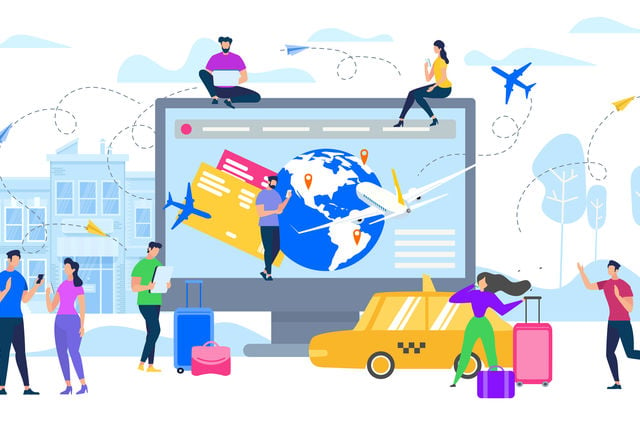Do the OTAs generate travel demand in hospitality? Part I - Digital Marketing Experts Point of View
10 experts shared their view
Typically, the demand for tourism to a particular destination is a function of a myriad of factors, including general state of the economy in originating country and destination, levels of income of tourists, the cost of travel and time to travel from the tourists' homes to the destination, trends in price levels - increasing or decreasing, competition from other destinations, currency exchange rates, etc.
Here is how Xotels formulates the definition of demand in the hospitality industry: By demand, we mean the level of travel consumer interest and needs: demand for beds, demand for family rooms, demand for conference or event space, demand for entertainment and sporting events, etc.
In my view demand in the hospitality industry is greatly dependent on the general travel demand for the destination and influenced by a myriad factors, including news about inflation, unemployment data and trends, job security or lack of it, trends in home prices - rentals or owned, news about airline cancellations and horror stories of people stuck in planes for hours, price of fuel, whether your family or friends are concerned or exposed to any of the above, etc.
Some argue that OTAs like Expedia and Booking with their $12 billion annual marketing spend generate demand for hotels.
Others argue that due to the numerous and complex influencing factors mentioned above, the OTAs do not generate demand in hospitality, but merely enable and service the already existing demand. At best the OTAs redirect existing demand from one hotel to another, rarely from one destination to another.
So, the question is: do the OTAs generate demand in hospitality?
The key word here is GENERATE versus STIMULATE. Generate implies production versus stimulate means raising the level or encouraging development. So, do the OTAs produce demand? Well, they are a distribution vehicle, not a producer. However, they do indeed stimulate demand, in that the mega-dollars they spend on advertising raise awareness of travel. Marshall McLuhan's "Medium is the Message" theory would argue for a merger of generation and stimulation. And, under that approach, the answer would be, YES.
In May 2023, during their annual Expedia Connect event in Seattle, Expedia shared recent insights from this latest "Path to purchase" report, due for publication this summer. At the inspiration stage, for example, we see that OTAs are NOT the main online source. The biggest source? Social media, according to 59% of respondents. DMO sites come in second at 42%, followed by meta travel sites, at 41%, and search engines, at 35%. Only 28% of respondents said they used OTAs at the inspiration stage, which is still a fair amount. (This proportion is obviously much higher at planning and booking stages, but that's not the point here today)
The other aspect to consider is the increasingly important role of loyalty programs, for both Booking (Genie) and Expedia (One Key). The more you book with your preferred OTA, the more points and rewards you garner, which leads to wanting to go places, redeeming these rewards. Thus, this is a form of demand generation.
Related article by Frederic Gonzalo
Oh, that's an interesting one, Max, bravo!
Look, while OTAs like Booking.com and Expedia excel at capturing high-intent demand in the mid and bottom funnel, they are unlikely to create demand from scratch.
Out of non-price factors that influence tourism demand, the destination's image remains the most crucial factor. We've all learned this at school: tourists' primary considerations when choosing a destination are attractions, amenities, and accessibility, which OTAs have minimal influence over.
Despite Expedia and Booking's substantial $10 billion marketing investment, it primarily targets mid-funnel or even bottom-funnel activities, such as branded search, conquering, and brandjacking.
It is doubtful that these vast funds will sway the minds of tourists who cancel their trips to Paris due to concerns about riots or those canceling their Rome visits due to temperatures exceeding 105°F.
However, their marketing efforts can (and do) influence the selection of one accommodation provider over another.
It's an interesting philosophical question. Chicken and Egg.
In my view the pure visibilty that the OTA provides increases the exposure and opportunity of travel, which leads to the idea and the act of actually travelling.
I often compare the digital world of today with the manual world of yesteryear in terms of how we acheived similar outcomes as an industry. In that case I believe most would agree that a traditional bricks and mortar travel agent, or a wholesaler played (and continues to play in many parts of the world) a part in generating demand for travel in the same way a DMO does.
As such through exposure in the digital world, digital travel entities also generate a level of demand to travel.
I would agree that they do help with generating demand across destinations depending upon how information is displayed on certain scenarios. Prompting the potential traveller to explore locations they had not immediately considered.
It's all advertising at the end of the day.
Travel demand comes from consumers' desire and ability to purchase a tourism product. Without question, OTAs do not affect people's ability or affordability of a tourism product. Yet, can OTAs trigger or increase people's desire to purchase a tourism product?
OTAs' promotions get people's attention, encouraging them to travel. The package deals offered by OTAs also make it easier for people to plan a trip. Additionally, the buddling deals are often cheaper, allowing those consumers who thought they did not have the budget for a vacation to reconsider their affordability. After being exposed to OTAs' promotions, some consumers might end up booking a hotel or a vacation package, either because they finally realize they can afford it or because they do not mind carrying additional credit card debts.
To conclude, OTAs will not stimulate the existing travel demand in the market (e.g., people must travel for business or other reasons). Nevertheless, OTAs can surface and actualize consumers' hidden travel demand. That is the demand from the consumers who could have chosen to spend money on other activities but ended up taking a trip instead. The challenge for practitioners, researchers, and economists is: How can such hidden demand be accurately measured?
OTAs thrive not in creating demand but rather in harnessing the existing travel demand. Consumers seek OTAs when they desire to travel; the power lies in OTAs being efficient one-stop platforms that meet existing expectations.
By offering a range of choices, personalised recommendations, and user-friendly interfaces, OTAs make it frictionless for users to explore potential travel products and convert their wanderlust into reality. With secure payment gateways, real-time booking confirmations, and readily accessible customer support, OTAs facilitate bespoke experiences, allowing prompt purchase decisions. Joint with diverse price points catering to a range of budgets, this is the ultimate 'shopping hub' for travel lovers.
The convenience and access to travel products address modern travellers' expectations, inviting more purchases. Research by Puspitasari et al. (2021) supports this correlation between travel-related purchases and satisfying experiences, stating that customer satisfaction, trust, and pleasure perception as the direct factors that drive purchases via OTAs. OTAs also mirror past customer experiences through reviews which drive credibility and higher conversions for travel brands (Chaffey, 2019).
This safe and easy accessibility to travel products builds awareness and online reach, ultimately helping the smooth execution of travel demand.
At the macro-destination level, my feeling is that OTAs have very limited influence on demand.
People travel for two reasons - because they have to (business) or they want to (leisure). And for this latter motivation, I'm not aware of many who make use of OTA platforms for inspiration.
While there may be some advertising-like effect, this is comparatively minor, with consumers instead using OTA channels to find accommodation/other travel services that match their needs once the destination decision is done.
It's at this "search and book" stage of the consumer decision making process that OTAs add value, allowing suppliers to position themselves in front of highly qualified potential customers and capture more than their fair-share of destination demand.
Yes, OTA's generate demand for travel. While social and economic trends influence demand as well, it is hard to argue that $12 billion of marketing spend simply services demand that already exists. Their advertising reminds people not only that they want to travel, but that there is a centralized repository of travel information that serves as a jumping off point. Seeing a billboard or TV or digital ads of beautiful, inspirational locations, which are typically features in OTA marketing, serves as one of many factors that spur consumers to take a step in their travel journey. It is just up to the rest of us when to intercede that travel journey to convince the guest that booking direct is in their best interest.
OTAs don't generate demand for hotels or a hotel destination, but they facilitate the ability for guests to book hotels in their target destination. Airlines are a greater contributor to travel demand than OTAs, particularly package holiday and tour operators like Jet2.
In my view, people who claim that the OTAs generate travel demand completely ignore the complexity of the Digital Customer Journey and its five phases Dreaming, Planning, Booking, Experiencing and Sharing/Retention. According to them, the customer Journey consists of a very simplistic "cast the hook" (marketing) and "catch the fish" (booking).
Google Research clearly shows that the digital customer Journey is very complex, takes many days, and is more like a meandering river than a straight paved road. The typical travel consumer goes through over 45 digital touch points before making a hotel booking - repeat website and mobile app visits, research on search engine and social media, customer review and metasearch sites, all of this across multiple devices, etc.
Does marketing also play a role in the decision making process? You bet! The question is, what kind of a role and how important of a role? At best, marketing is just ONE of a myriad factors influencing hotel bookers.
In my view, marketing is great at "massaging" travel demand, direct or redirect it to your destination and property, help engage the best potential customers, entice them with your hotel product and steer them toward booking your destination and property.










